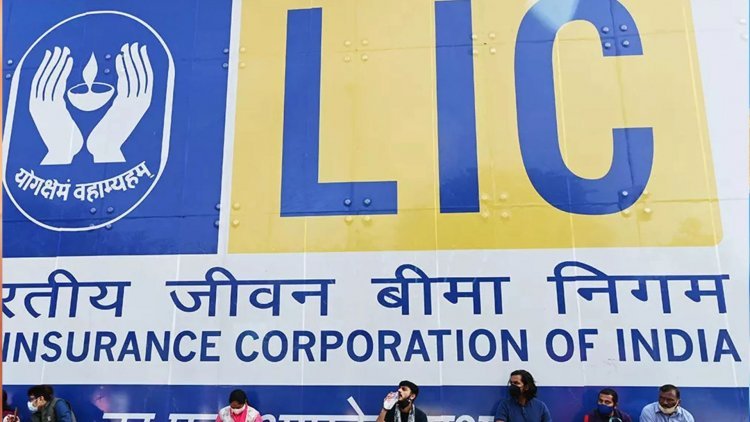Anxious LIC investors expect Aramco-style dividends after a weak market debut
Some investors and analysts are afraid that the price will continue to fall due to the legacy business's lack of growth potential and the likelihood of additional government disinvestment.

Shareholders of state-run Life Insurance Corp. of India will be hoping for a bountiful payout if Prime Minister Narendra Modi's administration wants them to remain put after a 7.8% drop that gave it the world's second-worst trading debut among large IPOs this year.
Last Monday, the 65-year-old insurer, known as LIC in India, raised $2.7 billion in the country's largest initial public offering. The stock fell as much as 9.4% to Rs 860 in the first minutes of trading on Tuesday after pricing at Rs 949 ($12.25) per share, the top end of a marketed range.
Some investors and experts are afraid that the price will continue to fall due to the legacy business's lack of growth potential, the danger of future government disinvestment, and the lack of significant shareholder incentives.
According to Jayesh Bhanushali, assistant vice president for research at IIFL Securities Ltd, the stock is a "strong portfolio hedge against volatility," but the shares could suffer headwinds in the medium term if the government decides to dilute its interest in LIC further. A "3 percent to 4% regular dividend" could be a "sweetener" to keep stockholders on board, according to Bhanushali.
LIC investors are adopting a page from Aramco's playbook, which promised investors a minimum dividend of $75 billion per year until at least 2024 in the world's largest-ever IPO. This contributed to Aramco's shares skyrocketing in its 2019 debut.
While LIC's offer documents make no such assurances, it's unclear whether or when the business would comply with investors' demands.
A spokesperson for the finance ministry declined to comment, while a representative for the LIC was not immediately available for comment.
If the stock does not return, millions of small investors who bid excitedly for the issue because of their long and emotional relationship with the insurance and its goods would be disappointed. In India, the company is well-known, with almost $500 billion in assets, 250 million policies, and nearly two-thirds of the market. A Rs 60 discount was granted to policyholders.
"LIC's dividend payout must be appealing to investors to preserve their faith in the stock," said Chokkalingam G, a strategist at Equinomics Research & Advisory Pvt. "The stock has fallen below the price at which it was allocated to retail investors, and if it falls any more, there must be something compelling investors to keep it."
LIC's IPO prospects have been dogged from the outset, with assessors offering wildly different valuation estimates. According to persons familiar with the situation, it was considering raising as much as Rs 50,000 crore ($6.5 billion). However, the government cut the aim because to a global slowdown in fundraising, the war in Ukraine, and rising interest rates. Despite the lack of investor appetite for equities, Modi's administration opted to go ahead with the IPO.
Brian Freitas, an Auckland-based analyst with independent research platform Smartkarma, said, "It's more a case of terrible timing than anything else."
Uncomfortably uncomfortable
According to Freitas, guaranteeing a dividend might have enticed some investors, but doing so would have required them to keep the stock for an extended length of time in this unpredictable market. He continued, "A lot of investors would be uncomfortable."
Local investors have nicknamed LIC's sale the "Aramco moment" in India, referring to the Gulf oil giant's $29.4 billion IPO in 2019. As spending and subsidies rose during the epidemic, some have dubbed it the "IPO of the decade." It was viewed as crucial to improving government coffers and decreasing the budget deficit.
Tuhin Kanta Pandey, secretary at the finance ministry's divestment department, said LIC's headquarters are "just five minutes from this site and of course it has taken 65 years to get listed" at the listing ceremony in Mumbai on Tuesday.
LIC's IPO is the fourth largest among worldwide IPOs done this year, and it comes at a time when large-cap offerings are scarce in financial centres from New York to London and Hong Kong. So far this year, no Hong Kong or European company has listed for more than $1 billion.
Once the price stabilises, some investors plan to hold LIC shares as part of their long-term wealth strategy.
"Dividends will assist," said Debkumar Bandyopadhyay, a 57-year-old Bangalore consultant. "State-owned businesses are sluggish. My investment was also motivated by the value that LIC provides, rather than growth."
A few investors took advantage of the drop on the first day of trading and bought.




 admin
admin 



















